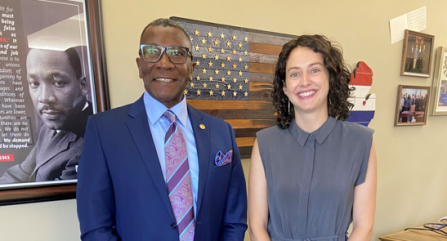
In September 2024 The Clean Economy Bridge went to several cities in Michigan, USA to speak to subnational and civil society leaders on the state’s clean economy transition. From the state level, TCB Lead Mary Hellmich spoke with Senator Roger Victory (R), Representative Amos O’Neal (D) and Chief Climate and Energy Strategist Kara Cook, as well as representatives from the Michigan Economic Development Corporation and the Michigan Public Service Commission. She also spoke with members of the Michigan League of Conservation Voters and the American Conservation Coalition Midwest, along with staff and administration members from Delta Community College.
The tour provided a comprehensive overview of the state’s green transition and shed light on areas ripe for transatlantic exchange. Michigan is positioning itself as a solar and EV battery manufacturing powerhouse. New clean energy projects have spurred $21.3 billion in investment, the 3rd highest in the country, and created or moved forward over 16,600 good-paying clean energy jobs, the 4th most in the country. In total, Michigan’s clean energy economy has more than 123,000 jobs. The Michigan Economic Development Corporation has an immense array of tools on hand to wield state and national funding to attract clean energy and tech business. The community college system is also crucial here, with a remarkable ability to quickly adapt to meet company needs for a changing clean economy workforce. A remaining challenge here is curriculum development for the auto sector and balancing ICE phase-outs and EV phase-ins.
In 2020, the Governor Whitmer announced the Michigan Healthy Climate Plan, which established the Council on Climate Solutions and set the statewide carbon neutrality goal for 2050. The MI Healthy Climate Plan lays out a pathway for Michigan to reach 100% carbon neutrality by 2050 to avert the worst impacts of the climate crisis, create good-paying jobs, and build a healthier and more prosperous, equitable, and sustainable Michigan for all Michiganders. It has seven objectives:
- Mitigate the worst impacts of climate change,
- Spur economic development and create good-paying jobs,
- Protect and improve the health of Michiganders,
- Position Michigan as a leader in climate action,
- Protect natural resources and wildlife,
- Make Michigan energy independent, and
- Address environmental injustices.
The Roadmap to 2030 included in the MI Healthy Climate Plan provides key recommendations to reach the 2030 goals of reducing GHG emissions by 52% from 2005 baselines by 2030 in an equitable manner.
Senate bills 271, 502, and 273, are the foundation of Michigan’s clean energy future and together comprise the Clean Energy & Jobs Act. This legislation will create new standards for Michigan’s clean energy landscape, paving the way for a significant increase in clean, efficient, and renewable energy production. The bills require utilities to achieve 100% clean energy portfolios by 2040 and 60% renewable energy by 2035. As such, the state is moving ahead rapidly with its renewable energy rollout. Though utility-scale projects are advancing full steam ahead, Michigan would benefit from more focus on small-scale and community renewable energy projects.
Environmental justice also takes center stage here. For the first time in Michigan’s history, the Michigan Public Service Commission will be required to specifically consider low-income Michiganders, environmental justice communities, and health when approving utility companies’ long-term energy plans. Also, for the first-time in Michigan law, “environmental justice community” will be defined based on disproportionate impacts, elevated health risks and other factors with consultation from Michigan Department of Environment, Great Lakes and Energy (EGLE) and the Office of Environmental Justice Public Advocate, and the bill also specifically requires the MPSC to consider whether future energy production will decrease air pollution in overburdened communities. In addition to incorporating environmental justice mandates into its climate legislation, Michigan also is also proactive and reaches out to communities before crises and job losses hit.
Michigan is advancing its clean economy transition at a remarkable pace, with actors leading the charge from the state government and agencies to the broad civil society spectrum. Of particular salience to transatlantic cooperation are the topics of electric vehicle infrastructure and education, environmental justice and small-scale and community renewable energy projects.
